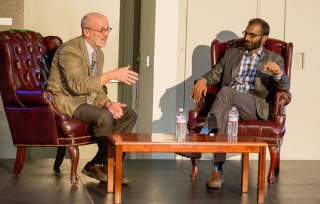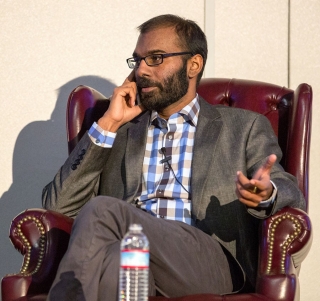October 22, 2014
A Conversation with a Cancer Patient About Palliative Care
Palliative care expert Timothy Quill held an intimate conversation with a Stanford neurosurgeon suffering from advanced lung cancer as an example of how physicians should talk to patients with serious illnesses about quality-of-life care.
The doctor and patient sat in comfortable leather armchairs, facing each other onstage in the School of Medicine’s Berg Hall.Timothy Quill, MD, a palliative care specialist, leaned forward, hands clasped on his knees, head tilted to one side. For about an hour, he asked short, pointed questions of Paul Kalanithi, MD, a 37-year-old Stanford neurosurgeon with advanced-stage lung cancer, encouraging him to talk about his illness.

End-of-life-care expert Timothy Quill carries out
a discussion with neurosurgeon Paul Kalanithi who
was diagnosed in 2013 with advanced-stage lung cancer.
Norbert von der Groeben
But mostly, Quill did what he trains other physicians to do. He listened.
“Are there things in particular that you worry about now?” said Quill, professor of psychiatry and medical humanities at the University of Rochester School of Medicine. He is an expert on end-of-life decision-making and how to preserve quality of care for seriously ill patients.
Kalanithi — a husband, new father and writer who recently completed Stanford’s neurosurgery residency program — paused for several seconds before responding.
“Not really,” he said. “I am sad at not seeing my daughter grow up, at probably not being here long enough for her to have a memory of me.
“I try to worry about things that are actually changeable. I worry about getting my book finished. I’d like to have that done for my daughter to know me.”
The 24th annual Jonathan J. King Lecture, held Oct. 21 at the Li Ka Shing Center for Learning and Knowledge, was different than what’s been presented as part of the lecture series in previous years. The series is presented by the Stanford Center for Biomedical Ethics.
Quill, the presenter, had asked Kalanithi to join him onstage to give a presentation on how ongoing doctor-patient conversations can help improve quality of care for seriously ill patients — a major goal of the branch of medicine called palliative care. Kalanithi agreed. He was diagnosed with the cancer last year, and has gone from a physician delivering bad news to patient living with it.
Taking on the roles
“We thought we’d have a conversation to see how we might do it,” explained Quill, who has written several books on end-of-life care and how doctors should address the emotional ramifications of illness, as well as the medical treatment plan, with their patients. For an hour, he played the role of Kalanithi’s physician. And Kalanithi played the role of patient.

Photo Caption: At the Oct. 20 event, Kalanithi
says he focuses now on "things that are actually
changeable." Norbert von der Groeben
“How are you now?” Quill asked, to open the conversation.
“I’ll give you the medical history in five sentences, if I can,” Kalanithi said. “I was diagnosed in May 2013, my sixth year of residency. At the time, I was having a lot of back pain, night sweats, fever. I was diagnosed with lung cancer. I responded well to Tarceva [a chemotherapy drug] for about a year.
“Then I had a relapse — last spring, a course of chemotherapy, which was extremely difficult with a number of complications. I was able to finish residency. Right now, I’m still kind of recovering from that cycle of chemotherapy.
“My last hospital visit was around July 1 or 2. My first child was born July 4.”
At this the audience applauded. Kalanithi introduced his wife, and pointed to her in the audience.
“Do you remember when you first got the news of your diagnosis?...
For full article click on this link:


Replies